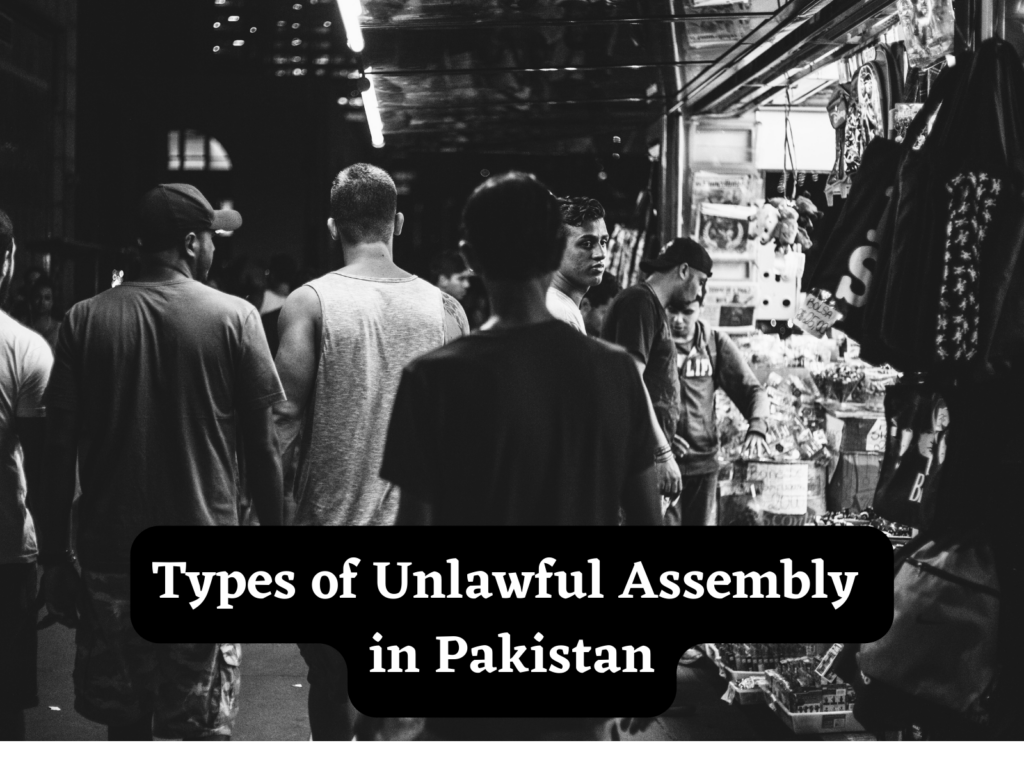Contact
Get In Touch

Author
Abdul Azeem
LLB (Hons) LLM
Unlawful Assembly Laws of Pakistan
Unlawful Assembly Laws of Pakistan: The right to assembly is a fundamental right of every citizen unless it’s an unlawful assembly in Pakistan. It allows people to gather and express their opinions, beliefs, and feelings on various issues. However, this right is not absolute, and it comes with responsibilities.
When people gather with the intent to cause harm, destruction, or chaos, they can be charged with unlawful assembly. This article will explore the basics of what constitutes unlawful assembly in Pakistan, with its legal punishments and variations.

What are the Unlawful Assembly Laws of Pakistan?
Unlawful assembly laws of Pakistan come into force when five or more people gather with the intent to commit a crime, cause a breach of peace, or provoke violence. The act of gathering alone is not illegal, but it becomes unlawful when there is an intention to cause harm or engage in illegal activities.
Within the unlawful assembly laws of Pakistan, The police have the power to disperse an unlawful assembly and arrest those involved. This is usually where the grey area of the law starts, and where common misconceptions are found.
“The law with regards to “unlawful assembly” is that no one is a member of “unlawful assembly” unless [they are] aware of the facts that render the assembly an unlawful one and intentionally joins or continues in it. Further, in order to find the common objective of an “unlawful assembly” at the beginning, it is not proper merely to take all the offences committed and to infer that all of these were from the beginning parts of its common object. The inference normally has to be based on more evidence than the mere acts themselves”
1984 SCMR 823
What defines a lawful assembly?
Events and get-togethers (lunch, birthdays, weddings, etc.) are examples of lawful assemblies as (and when) the common objectives of these assemblies are legal, friendly, and valuable to the community. These kinds of gatherings do not disturb the peace and are not against public tranquility.
Members of the public, whether invited or not, attend such an event with the common objective of having a good time without breaking any laws or harming people. To the extent that the premises they are on are being used with consent and permission (i.e., without trespassing).
“Unlawful assembly, assembly of four persons, not an unlawful assembly within the meaning of section 141 PPC. Their conviction under section 149 would be illegal”
1993 CriLJ 1387
The common objective of an Unlawful Assembly
Unlawful assembly laws of Pakistan are stated in the Pakistan Penal Code, stating that the 5 (or more) people who make up the alleged unlawful assembly must have at least one of the 5 common objectives: –
- To use or threaten to use criminal force or misuse of lawful power.
- To break the law, whether directly or indirectly (by not following the law).
- To commit a crime (of any kind), including (but not limited to) trespassing.
- To steal or deprive owners of their own property, or enjoyment of ownership of its rightful and lawful owner (i.e., by way of blockage), or to enforce their own rights over another with criminal force.
- To force others to do what they are not (legally, morally, ethically) meant to do, including the concealment of facts.
“Where presence of of eight persons in course of assault is established and out of eight accussed, four were acquitted on grounds of inconsistency in evidence with regards to their involvement, the conviction of the remaining four on charge of forming unlawful assembly is not illegal”
1992 CriLJ 339
In summary, the laws about unlawful assembly in Pakistan aim to balance the right to assembly with public safety and security concerns. While people have the right to gather and express their opinions, this right comes with the responsibility to do so peacefully and lawfully. Any gathering that involves violence, destruction, or criminal activities is considered unlawful and can result in severe legal consequences.
Types of Unlawful Assembly laws in Pakistan
Differences between Affray, Rioting, Looting, and Peaceful Protest
Affray: Affray is when two or more people engage in a public fight that causes fear or alarm to the public. It can be a result of an argument or disagreement between two individuals that escalates into a physical confrontation. Affray is a criminal offense that can result in imprisonment as well as a fine.
Rioting: Rioting is when a group of people engage in violent and disorderly behavior in a public place. It can involve damaging property, throwing objects at people or law enforcement officers, and setting fires. Rioting is a serious offense that can result in imprisonment and hefty fines.
Looting: Looting is when a group of people enter a store or property and steal goods without permission. It usually occurs during a riot or unrest when law enforcement is preoccupied. Looting is a criminal offense and can result in imprisonment and fines.
Peaceful Protest: A peaceful protest is when a group of people gathers in a public place to express their opinions or beliefs on a particular issue. It is a constitutional right and is protected by law. A peaceful protest involves nonviolent actions, such as chanting, holding signs, or sitting in silence. It does not involve any violence, destruction, or criminal activity.
“In order to constitute an unlawful assembly, apart from the minimum numerical strength of five persons, the members of such assembly must be actuated to commit one of the offences as specified under section 141. The question as to what is actual common object of the unlawful assembly is is entirely a matter of inference depending upon the facts and circumstances of each case”
1988 Pat LJR 302
Get in touch with a criminal lawyer in Pakistan today
Unlawful assembly is a serious offense that can have severe consequences. It is essential to understand the differences between affray, rioting, looting, and peaceful protest to avoid breaking the law inadvertently. While the right to assemble is a fundamental right, it comes with responsibilities.
For further information, simply fill out the form below, and one of our criminal lawyers in Pakistan will get back to you. Alternatively, you can contact us at 0092 308 5510031 by call or WhatsApp.
We Help You Solve Your Legal Issues
At 24Justice, we believe that everyone deserves access to justice, and we are committed to making that belief a reality. Choose 24Justice, and take the first step towards navigating your legal journey with confidence and ease.
